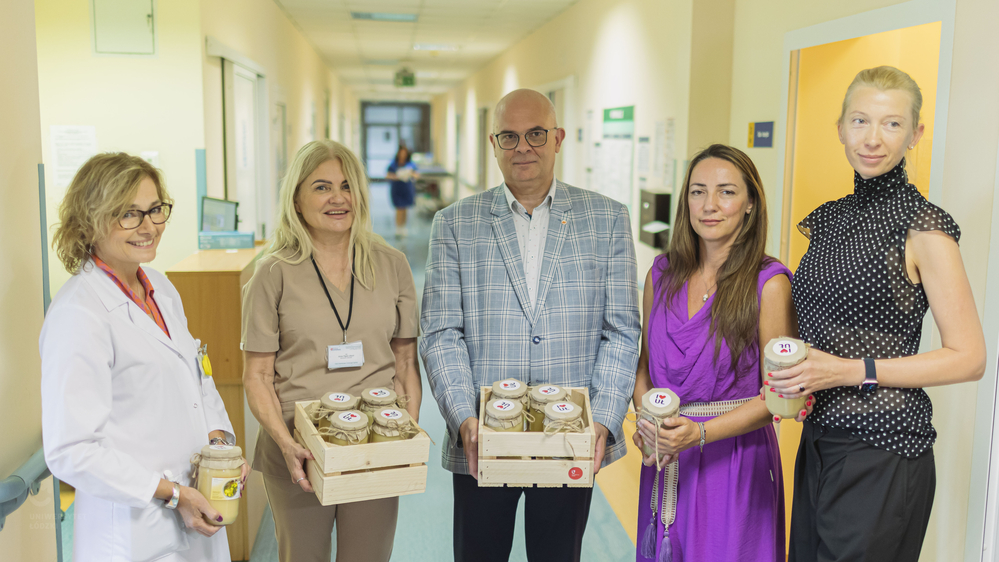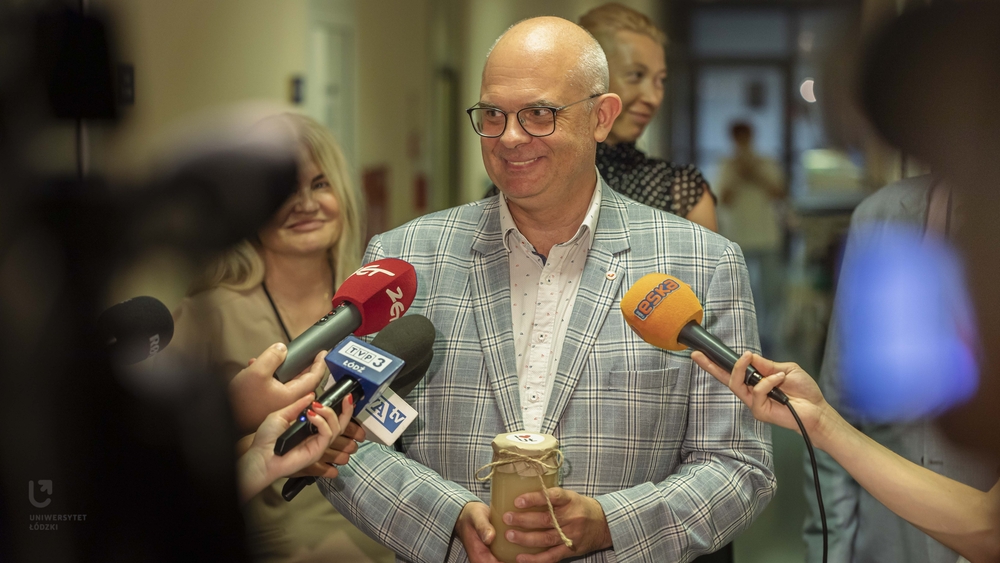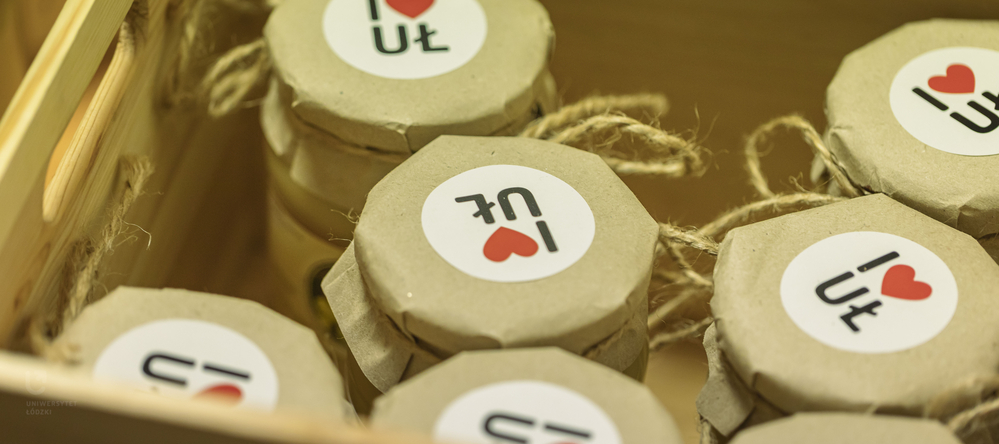
from left to right: Dr Beata Chmielewska-Pytka, Dr Anna Papis-Ubych, Prof. Robert Zakrzewski, Beata Gamrowska, Magdalena Janus-Hibner
A sweet gift from the University of Lodz
The donated honey includes multiflora, acacia, rapeseed and phacelia honey. Scientific studies show that honey supports oncological treatment of head and neck cancer patients thanks to its shielding effect on the oral mucosa, which counts during radiation treatment. Furthermore, honey can be used in the post-operative treatment of cancer wounds and in the treatment of cancerous ulcers.
This is the second time we have donated honey to the ward. We would like it to become a tradition. Next year we will be donating honey from the roof of the University of Lodz Library, as well as from the premises of the Faculty of Economics and Sociology, where there are also beehives. We are pleased to be able to contribute to action for patients today – it’s a platform for cooperation between the University of Lodz and the hospital. We want to be pro-environment, pro-health for society, for Lodz and for the Lodz Voivodeship
– said Prof. Robert Zakrzewski, the University of Lodz Vice-Rector for Student Affairs and Quality of Education.

The donated honey comes from an organic apiary in the vicinity of Łagiewnicki Forest. The apiary is looked after by beekeepers from the Lodz Apiarist Association, who carry out specific work throughout the year to properly manage the development of the bee colony, obtain bee products, protect the bees from disease, pests and parasites and make sure the bees have the necessary conditions for survival, including in the apiary on the roof of the University of Lodz Library.
We would especially like to thank the University of Lodz for its continued cooperation. We work closely with the Faculty of Economics and Sociology, the Biobank of the University of Lodz, so this is yet another level at which the University of Lodz is a really huge and important partner for us when it comes to helping the hospital. Here, we are entering the subject of nutrition – a diet, which is very important when it comes to cancer treatment. We continuously strive to provide our patients with complete, comprehensive and coordinated oncology care and, among other things, diet and education on how an oncology patient should eat. Additionally, a diet in oncology prevention is very important to us
– said Magdalena Janus-Hibner, Deputy Director for Projects, Development, and Organisation of Oncology.
Beehives on the roof of the University of Lodz Library
The association and the UniLodz Library jointly run the Beeblioteka [Bee-library] UniLodz project – there are ten hives on the roof of the library, which are home to around 600,000 insects. Bee colonies support the urban ecosystem by pollinating plants around the library.
A year ago, we donated 20 litres of honey from the hives on the roof of the library. For the past two years, we have been implementing the Beeblioteka UniLodz project together with the Lodz Apiarist Association. Currently, we already have 10 hives on the roof
– said Beata Gamrowska, Coordinator for the Library Promotion at the University of Lodz
There are many benefits of keeping bees in such places. First and foremost, these insects pollinate urban plants, enabling them to produce seeds and fruit, which in turn helps sustain the bee population. The green surroundings of the University of Lodz Library are an ideal place for hives – the proximity of Jan Matejko Park and the surrounding squares of the university campus are particularly important in this case. To make 1 kilogram of honey, insects need to visit around 4 million flowers.
The idea of the Beeblioteka was born in early 2020 – it was one of the most important initiatives to commemorate the 75th anniversary of the University of Lodz.
Health-promoting properties of honey in oncology treatment
Dr Anna Papis-Ubych, the Head of the Department of Radiotherapy and General Oncology, spoke about the importance of honey in the diet of oncology patients:
We would like to thank for the donated honey. Every gift matters, it is very important. The combination of practice and learning is very important. Honey has antiviral, antibacterial, antifungal and anticancer properties. It provides easily digestible carbohydrates, lots of vitamins, minerals, magnesium, iron. All this considerably supports the cardiovascular, gastrointestinal systems, the digestive tract. It regenerates the mucous membranes and the skin, which is often damaged during cancer therapy, during chemotherapy or radiotherapy. It is very important for our cancer patients who are undergoing radiotherapy and chemotherapy. It has regenerating properties, accelerates the renewal processes of mucous membranes and skin.
Honey is added to food and is eaten on its own by the patients. Dr Beata Chmielewska-Pytka, a specialist in radiation oncology who, among other things, heads the Health Education Unit, added:
We use radiotherapy, i.e. sessions that patients attend every day, whereas a hospital diet is given three times a day, depending on the needs of our patients and the profile of additional diseases. Honey is of great importance. Of course, we take into account patients who cannot use it in large quantities, e.g. diabetics. We do not treat children at our department until they are three years old because of the importance and immunising potential and in exceptional cases where patients are allergic to bee products.
Rapeseed honey is well tolerated and of importance in the diet of patients with urinary tract diseases. Honey also contains flavonoids, substances that destroy free radicals. These, in turn, take part in the destruction of cellular DNA, which is the reason for tumorigenesis. Phacelia honey is effective in the case of any inflammation of the digestive tract or stomach, or inflammatory changes in the intestines. Acacia honey, on the other hand, supports immunity, and multiflora honey is a wealth of all that honey contains.
Photo report of the honey handover
Source: University of Lodz Library
Edit: Iwona Ptaszek-Zielińska, photos: Maciej Andrzejewski, Commuications and PR Centre, University of Lodz
The mission of the University of Lodz is to conduct reliable research and actively disseminate facts and research results so as to wisely educate future generations, be useful to society and courageously respond to the challenges of the modern world. Scientific excellence is always our best compass. Our values include: courage, curiosity, commitment, cooperation and respect.

